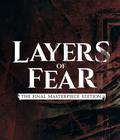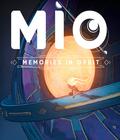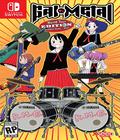Buy Gal Metal
Most rhythm games are interactive jukeboxes. There's nothing wrong with this approach, and it's done a good job of expanding the appeal of the rhythm genre, even if it's pretty niche nowadays. There was a time when rhythm games had narratives, and just about all of them were inherently silly affairs. Gal Metal is a Nintendo Switch exclusive that takes players back to a time when there was a story that helped connect all of these musical performances together. It also happens to be a rhythm game that eviscerates almost everything you know about the genre.
The story starts off in the Japanese town of Kichijoji, a place that is described as normal yet boring enough that nothing happens here. On the way home from school, a teenage boy is abducted by aliens. After finding himself alongside a teenage girl, he discovers that the alien octopi are out to destroy earth, blaming their dilemma on the Golden Record sent by Earth on the Voyager satellite decades ago. The heavy metal music caused the aliens to be disoriented, and now they've come to Earth, vowing to destroy it in two days' time. Seeing as how they only need one person telling the world that the aliens are coming, the octopi decide to merge the boy into the girl's body. Luckily, the girl runs the heavy metal club at school, and it'll be up to her band to save everyone.
If it isn't apparent in the first cut scene, the story is silly, and things don't get any more serious from there. After all, we're talking about a tale where the band goes to space for one song before being teleported back to town. It's all fun, especially when you start to see optional scenes, like seeing the shyest character working in a department store as a glorified mannequin.
Gal Metal is quite heavy on the story. Each of the 13 chapters features at least three to four sets of cut scenes, and that ranges from simple manga-style pages with the camera darting between each panel to text chat room conversations, where you have the opportunity to make some choices, but none of them alter the story. All of the scenes can be skipped, but if you choose to go through them, be aware that none of it is voiced, and you'll need to manually advance to the next panel or text bubble.
The main focus of the gameplay are the songs, and while 13 seems like a paltry number nowadays, it falls in line with just about every other story-based rhythm game out there. You aren't getting completely original songs here but metal renditions of classic songs, so they'll sound familiar. It would've been nice if they went for original compositions, though. The game already has DLC with more story and five more songs to go through, so if you're a completionist, expect to pay $10 more to get the DLC unless you go for the physical edition, which already comes with the DLC but costs $10 more than the digital version, making both versions equal in cost.
The game supports three control schemes, and there is no variable difficulty level. When using either the touch-screen or the physical controller buttons, you're given 10 different drum parts to hit, including the crash cymbals, hi-hat, kick drum, and so on. While you have to appreciate the fact that they tried to cram all of that into a button layout, it remains rather unwieldy, so it's tougher to get a good score on any song this way. The touch-screen is a better method in this regard, since you can see and tap exactly what you want to hit, but it means you're restricted to only playing this game in handheld mode.
The easiest control method — and the one the game wants you to use — is motion controls via the dual Joy-Cons. The 10 different drum pieces are distilled into a tom for the right controller, the snare for the left controller, and the cymbals when you use both Joy-Cons simultaneously. The controller itself isn't terribly accurate when it comes to hitting things on time, but there's a decent amount of leeway for your strikes, and with so few things to keep in mind while playing, this is the best method to beat the game.
No matter which control method you use, the title's unusual selling point is that there are no visual indicators to follow. There are no note lanes to focus on, and there are no notes to see and hit when they go over a designated area. Instead, the game removes all of that and has you drumming out a beat according to the song's tempo. The only hint about note timing comes from the count-up at the beginning of the song. The success and failure of your performance relies on your sense of the song's rhythm.
The removal of notes and a note highway means that Gal Metal has a much higher learning curve than other rhythm games, except for the first one you played when introduced to the genre. If you have a great ear for rhythm, you'll fare better than others who don't have a keen sense for it, but you'll still either plod out the same beat with a singular tom or snare just to get a feel for the song or hopelessly flail around in hopes of stumbling into something. You'll beat the stage, but it'll be unsatisfying due to the average grade you'll receive.
Once you find the rhythm, the game suddenly opens up. The beating of the virtual drumsticks becomes natural, and when you reach a song with a completely different rhythm, the deliberate absence of traditional rhythm elements starts to makes sense. You aren't taught many techniques early on, but you'll be inspired to experiment by hitting different combinations and change the rhythm in the middle of a song — something that can generate bonus points. This is where it gets fun, and for those who feel that rhythm games are getting stale, this title will quickly change their minds.
Beyond the actual rhythm portions, Gal Metal gives you opportunities to level up your performance stats by hanging out in places, sometimes with your friends. The opportunities give you a chance to see special cut scenes you'd otherwise never encounter, but they're few and far between. Instead, most of your time spent with friends has you both in the same place while the stat buffs get tabulated, so what could've been a fun diversion from playing music ends up being a means to an end.
Beyond the campaign, the game doesn't have too much to do. There's a practice mode where you can practice the different rhythm sections or discover new timings and combinations that can net you a higher score. There's also a free play mode, which has you replaying the same 13 songs but with four different score thresholds to beat. The score thresholds are exponentially higher than what you need to beat the same level in the campaign, but your score bonuses scale accordingly, so winning isn't as difficult as it initially seems.
Graphically, the game is rough in a good way. The cel-shaded style is great at displaying bold and distinct colors, but the actual drawing style for all of the elements lacks polish. These all look like they were done with only one quality pass, so both the people and aliens can look a bit off, especially in the manga-inspired cut scenes. This is especially evident when you notice how angular some of the characters are and how their animations can be less than smooth. While this normally comes off as a strike against any other game, it gives this title a distinct style and identity, similar to how last year's Floor Kids owned its sketchbook style. At the very least, the game moves at a solid 60fps at all times, and the texture work is good on most things.
Gal Metal is a rhythm game that may be an acquired taste for some players. The lack of direction will be confusing at first, but once you get used to listening to the song a few times, you'll come to appreciate the more freeform nature of rhythm. Though the game lacks original tracks, it does a good job with the metal-tinged classic songs, and while the story has seemingly endless cut scenes, at least it's humorous. While the Switch has a number of solid rhythm games, this flawed title is still worth checking out if you're looking for a different experience.
Score: 7.0/10
More articles about Gal Metal













 Gal Metal is a rhythm game that turns the Joy-Con into drum sticks, where players will take hold of the Joy-Con and rock along with the music in order to repel would-be alien conquerors.
Gal Metal is a rhythm game that turns the Joy-Con into drum sticks, where players will take hold of the Joy-Con and rock along with the music in order to repel would-be alien conquerors.











